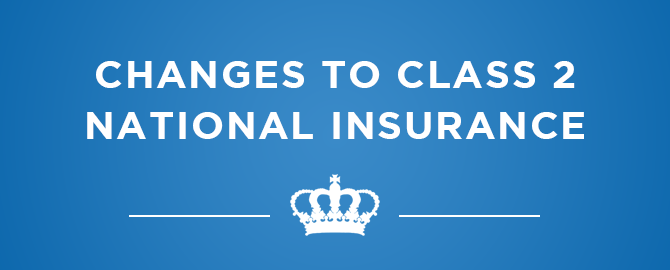
Some accountants have been telling their clients that if they want to claim they run the “business” as a “partnership” then they will automatically have to pay National Insurance.
“That can’t be right”, I hear you cry!
Well it’s not quite clear cut, so I decided to do some more research on the subject and came across a very helpful article published by the ICAEW, to which I credit the remainder of this page:-
This clarity has been achieved by the National Insurance Contributions Act 2015 (NICA 2015), through the reform of Class 2 NIC from 6 April 2015.
Class 2 NICs may be due from self-employed earners.
A self-employed earner is defined at s2(1)(b), Social Security Contributions and Benefits Act 1992 (SSCBA 1992), as ‘a person who is gainfully employed in Great Britain otherwise than in employed earner’s employment (whether or not he is also employed in such employment)’. ‘Employment’ has been defined by s 122, SSCBA 1992, for many years as including any trade, business, profession, office or vocation, ie, not just self-employment, but working for a living generally.
The key word here is ‘business’. A person who is liable to income tax on the profits arising from the receipt of property rental income, will be a self-employed earner for NIC purposes if the activities carried out amount to running a business. This much has not changed. Those in business letting property before 6 April 2015 had a liability to Class 2. Now they can opt to pay voluntarily.
HMRC explains that property letting requires some activity to maintain the investment, but that activity alone is not enough to make it a business. For example, being a landlord normally involves:
· undertaking or arranging for external and internal repairs,
· preparing the property between lets,
· advertising for tenants and arranging tenancy agreements,
· generally maintaining common areas in multi-occupancy properties, or
· collecting rents.
In order for a property owner to be a self-employed earner, the property management activities must extend beyond those listed above.
For example, ownership of multiple properties, actively looking to acquire further properties to let, and where letting property is the property owner’s main occupation, could be pointers towards there being a business for NIC purposes.
Before the NICA 2015 changes, having a business of letting property would make a person self-employed for NIC purposes and there would have been a Class 2 NIC liability as a result, subject to a claim for small earnings exception (SEE).
NICA 2015 has changed the basis of Class 2 – compulsory Class 2 contributions (new SSCBA 1992, s 11(2)) will now only apply if the income of the self-employed earner is within Class 4, ie, income from a trade, profession or vocation taxable under ITTOIA, Part 2, Chapter 2 and above the ‘small profits threshold’ (the SPT, which has replaced the SEE).
Those landlords who are in business, but who are now self-employed earners without a Class 4 income are eligible to pay Class 2 contributions under the new s 11(6), SSCBA 1992, but they are not obliged to pay.
On the other hand, a landlord who is liable to income tax and Class 4 NIC on the profits of a trade, profession, or vocation in the UK because he or she offers more than just let property (see below), will automatically be a self-employed earner for NIC purposes (and so liable to Class 2 and Class 4 NICs if profits exceed the SPT and lower annual limit respectively).
A landlord is a self-employed earner, potentially liable to both Class 2 and Class 4 NICs if the activities amount to a trade for income tax purposes. This could include, for example, receiving income from other services such as providing a bank of washing machines in a multi-occupancy block that is rented to tenants, or providing an ironing service to tenants. Running a guest house or hotel will also usually amount to a trade for income tax purposes, so an individual proprietor will be a self-employed earner. This did not change at 6 April 2015.
If a property owner has an agent who manages the property/ies, things that the agent does should be attributed to the owner. ‘Agent’ includes a friend or family member, as well as a professional managing agent. However, a property owner will only be a self-employed earner on this basis if the things that the agent does for the property owner are enough to count as a trade.
In summary:
- Letting property may amount to being in business, but if it does not, there is not (and never has been) a liability or entitlement to pay Class 2 NIC.
- If letting property does amount to a business, but not a trade, it makes the landlord a self-employed earner eligible to pay Class 2 NIC (he or she would have been liable to pay Class 2 before 6 April 2015).
- Where the letting business is also a trade because it includes more than property letting, the profits are liable to compulsory Class 2 and Class 4 if the trading profits exceed the relevant thresholds.”
Was this the biggest landlord tax planning event ever?


Old Mrs Landlord
Become a Member
If you login or become a member you can view this members profile, comments, posts and send them messages!
Sign Up19:36 PM, 3rd June 2017, About 8 years ago
Reply to the comment left by "Old Mrs Landlord" at "03/06/2017 - 14:44":
Don't bother - I Googled it.